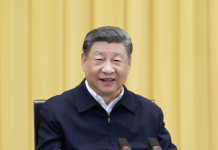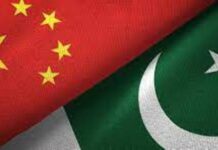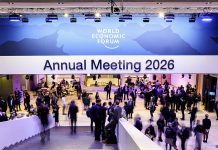BEIJING: Despite repeated calls both in the United States and worldwide for Washington to lower the temperature of its contentious relations with China, U.S. politicians have continued to fan the flames of hostility towards Beijing through spreading anti-China lies while upending the world order it groundlessly accused China of sabotaging.
Those in Washington should wake up to the fact that China has no intention of scrambling for influence with any other countries, and that the United States should play its due role to maintain global peace and stability, and shoulder the responsibility as a major country by engaging China in good faith and in a constructive manner.
Outlining the China policy of the current White House in late May, U.S. Secretary of State Antony Blinken rehashed the same old “China-threat” theory, hyped up the you-win-I-lose style competition and bloc politics, peddled lies about China’s human rights records, and smeared China’s domestic and foreign policies.
Blinken’s notion laid bare Washington’s obdurate Cold War mentality, as it becomes increasingly paranoid by the fact that China is steadily on the rise by virtue of its wisely-tailored development plans, and that its own global hegemony is in constant decline.
However, Blinken’s harangue has fooled no sober-minded observer. For example, Zachary Karabell, founder of the Progress Network, wrote recently in an article published by The New York Times (NYT) that Washington’s “intensifying fixation” on hyping up China’s threat to the world order “shrinks space for cooperation with Beijing,” at a time when looking for ways to work with China is all too logical and necessary given the myriads of challenges humankind faces.
Karabell, also an author, columnist and investor, wrote that all the things Washington claimed it worries about “don’t necessarily make China a threat to American prosperity and security.”
Grounding foreign policies on imaginary situations is a “slippery slope,” he said.
Unfortunately, what Karabell has warned about is exactly what Washington has been doing.
It has tried to contain China every step of the way — economically, technologically and militarily — and smear China repeatedly with long-debunked lies.
The most recent example could be found in the 19th Shangri-La Dialogue, where U.S. Secretary of Defense Lloyd Austin pitched the so-called “Indo-Pacific Strategy” to rope regional countries into its anti-China agenda.
Washington’s grand strategy is “deeply flawed,” Scottish historian Niall Ferguson wrote in an opinion published recently on Bloomberg.
Ferguson, a U.S.-based senior fellow at both Stanford University and Harvard University, said it scares him Washington reached a bipartisan consensus that “resisting China’s rise should be the foundation of American foreign policy.” –Agencies






